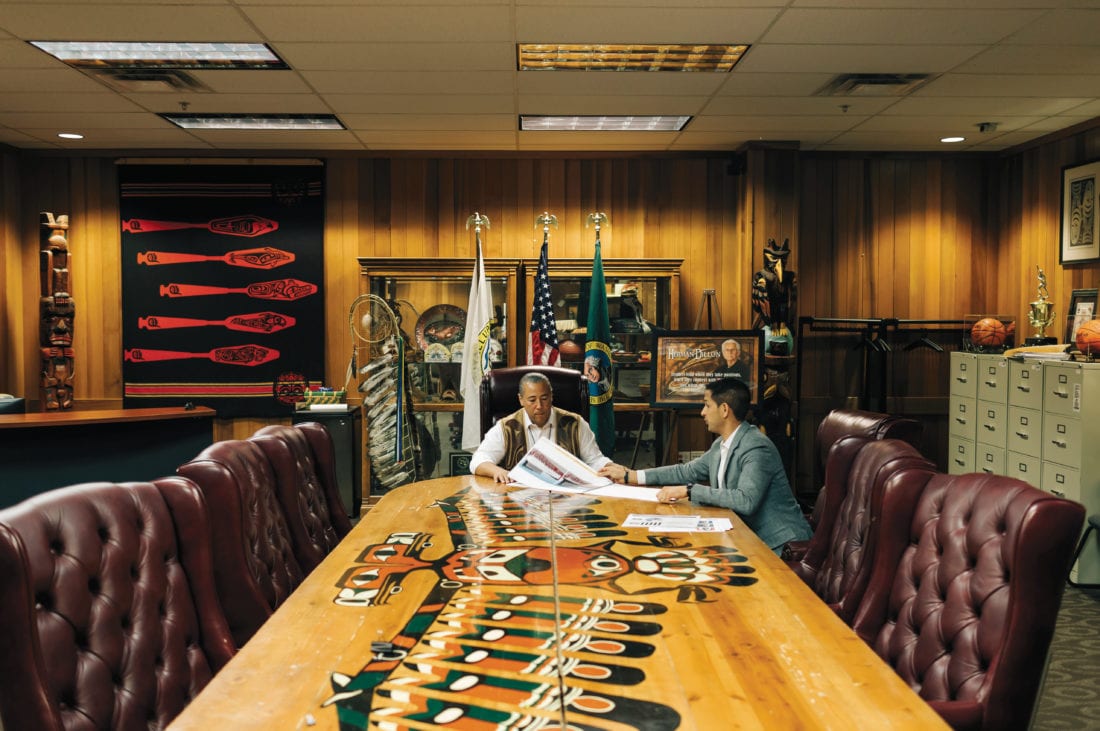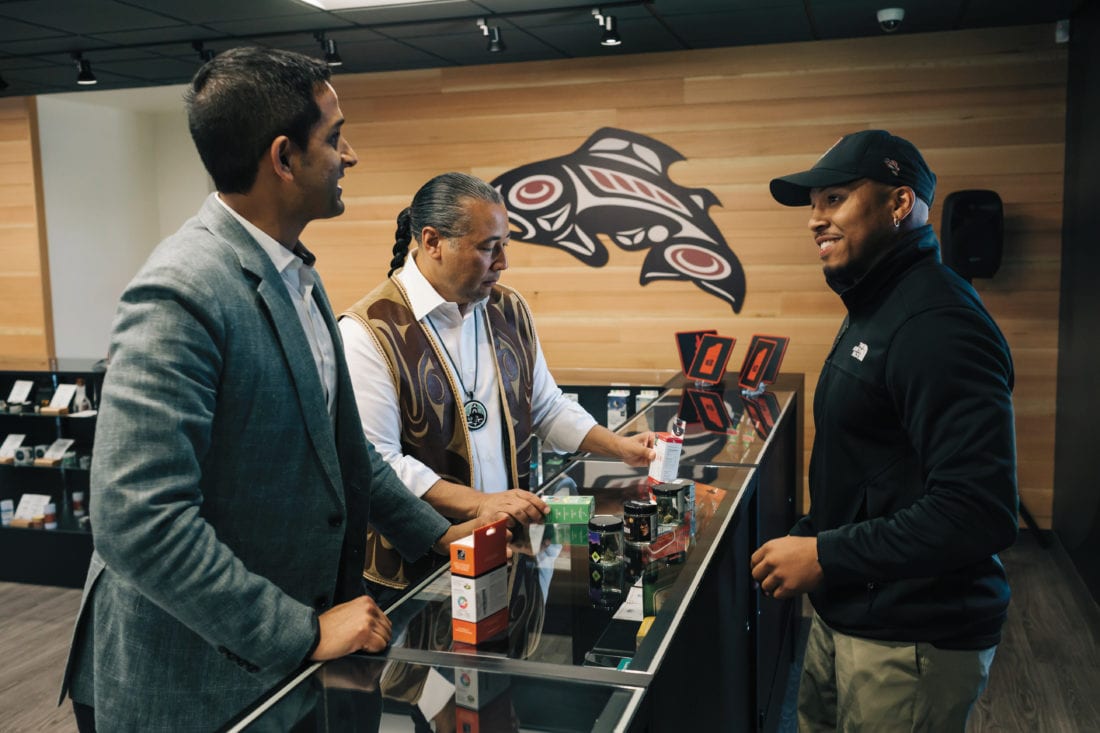Matthew Wadhwani, MBA 13, is changing the game for the Puyallup Tribe of Indians

When Matthew Wadhwani, MBA 13, makes a financial decision at work, it’s not a company’s bottom line he’s focused on. It’s the financial security of his wife and new son, his extended family, his community, and future generations.
No pressure.
Wadhwani is the assistant tribal financial officer for the Puyallup Tribe of Indians in Washington state—one of two people tasked with handling the Tribe’s $600 million budget.
The other is his boss, Tribal Financial Officer Julie Hamilton. Both are certified public accountants, but Hamilton has a law degree. Financial analysis and planning, then, falls to Wadhwani with his MBA.
“The Tribe has been status quo for a while, so I get to make changes that are impactful and meaningful, like collecting data on our businesses and giving them metrics on what they’re doing,” says 35-year-old Wadhwani, a member of the Tribe. But the responsibility is great. “I don’t have anyone to really check my work. If I’m going to make a recommendation that will impact a lot of people, you want someone to play devil’s advocate.”
With a reservation straddling the cities of Tacoma and Fife, Washington, the Puyallup Tribe is a sovereign nation, meaning it functions differently from most municipalities. While towns and cities rely on taxes for income, the Tribe generates its money internally, primarily through gaming but also through federal grants and now cannabis stores. It is a self-sustaining government and adheres to federal law but also provides all the services of a government, including a tribal police department, school, and health authority. There’s also a casino (with a second one opening soon), a cancer-treatment center, a deep-water port, fish hatcheries, and more.
A typical workload for Wadhwani might have him reworking cannabis pricing (see sidebar, p. 23), managing the new casino’s construction and loan compliance, overseeing a new player-tracking system in the current casino, helping the school find funding for repairs, and convincing the Tribe to change an investment strategy.
Good thing Wadhwani is a whiz at letting numbers tell stories. He engenders trust with his meticulous analysis and his ability to let data do the talking.
Wadhwani’s recommendations are taken up by a seven-person Tribal Council that sets policy for the Tribe, sometimes putting proposals to a vote by the Tribe’s 5,500+ members. The tribal government can decide to take Wadhwani’s recommendations or not. But he’s not afraid to tell them—or any of the Tribe’s members—hard truths. Hamilton says it’s not uncommon for Wadhwani to say unpopular things in tribal meetings. “But he’ll be very factual and very respectful about it and say something that needs to be said,” she says. “It’s a breath of fresh air to have that.”
The Tribe has been status quo for a while, so I get to make changes that are impactful and meaningful.
Banking on Data
For Wadhwani’s part, he sticks to the numbers. “Power and Politics in Organizations is the most important class I took at Berkeley,” he says. “The Tribal Council loves me half the time, and I think they hate me half the time. But at the end of the day I have their respect. You get that by backing up every recommendation you make with concrete data.”
The Tribe has numerous business interests, all of which Wadhwani needs to understand. What he lacks in expertise, he makes up for in self-education.
“I know what I know, and I know what I don’t know,” Wadhwani says. He’s become the resident expert on just about everything. Should the Tribe partner with the state of Washington, for example, to study medical marijuana as a treatment for opioid addiction? (Probably not, says Wadhwani.) How can the new casino best implement sports betting? (Ask Matt!)
As the Tribe’s main source of revenue, casinos are something Wadhwani has studied closely. He had to become an expert in order to secure a $450 million loan with favorable terms for the new Vegas-style casino the Tribe is constructing.
Tribal Chairman David Bean says Wadhwani allayed their fears about the debt. “It’s a large number; it’s scary,” says Bean. “But it was easy to engage in that one when Matt runs through the projections for how developing a new casino will impact our income-generation capabilities.” The new casino is slated to open in December. Wadhwani is a member of the executive team overseeing the construction.
Building the new casino was a huge decision for the Tribe, whose fortunes have ebbed and flowed over the past 30 years. Growing up 15 minutes from the reservation, Wadhwani remembers the Tribe being financially strapped then seeing the windfall—and challenges—that gaming brought when introduced in the 1990s.
The tribal government overspent and failed to create a long-term investment plan; numerous outside consultants took advantage of them.

The Path Home
Such instability is perhaps one reason why Wadhwani’s career goal was always to work for his Tribe, a job members liken to working for a family business. But to get there, he took a circuitous path. He earned his bachelor’s in business economics from UC Santa Barbara in 2006 then worked as a senior auditor at Deloitte in Los Angeles for two-and-a-half years before becoming the Tribe’s senior financial analyst.
During that first two-year stint with the Tribe, Wadhwani helped create a 10-year strategic plan to address the Tribe’s multimillion dollar financial deficit and suggested ways to improve fiscal responsibility. He also partnered with Junior Achievement to establish a financial education program for tribal youth. It has since spawned an annual two-week summer camp for some 30 kids, ages 14 to 18, to learn the basics of finance and the importance of college. Wadhwani speaks at the camp every summer.
Wadhwani’s mentor, Chad Wright, one of the only other tribal members with an MBA (from Stanford) encouraged Wadhwani to attend graduate school—and to work in corporate America—to broaden his perspective. Says Wadhwani: “The Tribe doesn’t have the luxury of training members, so it’s important for people to go outside and get that expertise.” Wadhwani earned his Haas degree then worked at Mattel for two years before coming home in 2015 to his current job with the Tribe.
Wright says Wadhwani is a good role model for the community. “There’s sometimes a sense of entitlement that comes with being a family business,” Wright says. “Matt has shown commitment and earned his role, which is going to help elevate the expectations of others.”
Chairman Bean lauds Wadhwani’s outside experience. “Berkeley helped Matt elevate his game, and he looks at the world much differently than the rest of us,” Bean says. “He sees things that we don’t see.”
Upon his return to the Tribe, for example, Wadhwani encouraged changes to the Puyallup retirement plan that would yield greater returns. Changing the investment strategy of a sovereign nation is no small task, but Wadhwani’s persistence propelled him forward and helped him get buy-in. It’s a determination he brings to all of his work, Wright says.
“Matt doesn’t talk about the things that he might be able to do. He actually does it, and that speaks for itself,” says Wright, the CEO of the tribally chartered entity Marine View Ventures, which oversees real estate holdings, a marina, and other enterprises. “He’s figured out a way to move things forward, whether it’s a banking relationship or investments at the tribal level, to get beyond the stalemates within Tribal Council. These are not small tasks, some of them are multi-year projects. And we all share in the results.”
Mentoring Others
College is a path Wadhwani hopes more members of the Tribe will follow, and he speaks often to teens to mentor and encourage them. The irony of all his hard work ensuring the Tribe’s financial stability, however, is that it’s also dissuading the young adults from pursuing higher education.
Every tribal member earns monthly disbursement payments. For minors, that money goes into a trust, which they receive at age 18. Unfortunately, not all the young adults know the best way to handle such a sizable payment. Some spend it quickly, give it away, or are taken advantage of by close friends and family; others get caught up in drugs. “I always use the analogy of sports stars coming into a lot of money and not knowing how to manage their funds,” Wadhwani says. “We’ve seen teenagers and 18-year-olds not incentivized to go to school.”
Wadhwani himself never earned such a check since the Tribe didn’t own a casino when he turned 18. Wadhwani, though, never gives up. He meets with teens about to receive their money to fully explain their financial options. He’ll even drive them to a bank or investment firm, if they’d like, and walk them through a financial strategy.
To encourage more financial responsibility, Wadhwani is working to create a trust with new terms, spreading out payments from ages 18 to 25 and requiring a high school education or equivalent. He also received Council approval to invest with Goldman Sachs versus U.S. treasuries, a move that could eventually double the payout.
Wadhwani isn’t sure that’s a good thing, giving youths more money, but he’s always mindful that the financial decisions he recommends impact the Tribe’s future. And helping secure the Puyallups’ longevity is a joy for Wadhwani. “One of the great things about working for the Tribe,” he says, “is you get to see tangible benefits going to the people.”
Chairman Bean says Wadhwani’s work is crucial. “Matt is changing lives and saving lives,” he says. “He has mentored many young business owners in our community and takes the time to talk with our children about education, about assessing their resources—he’s inspired the next generation of leaders. We hold him in high regard, and we have a tremendous amount of confidence that he will not let us down in any way. He’s changed the game for the Puyallup Tribe.”
